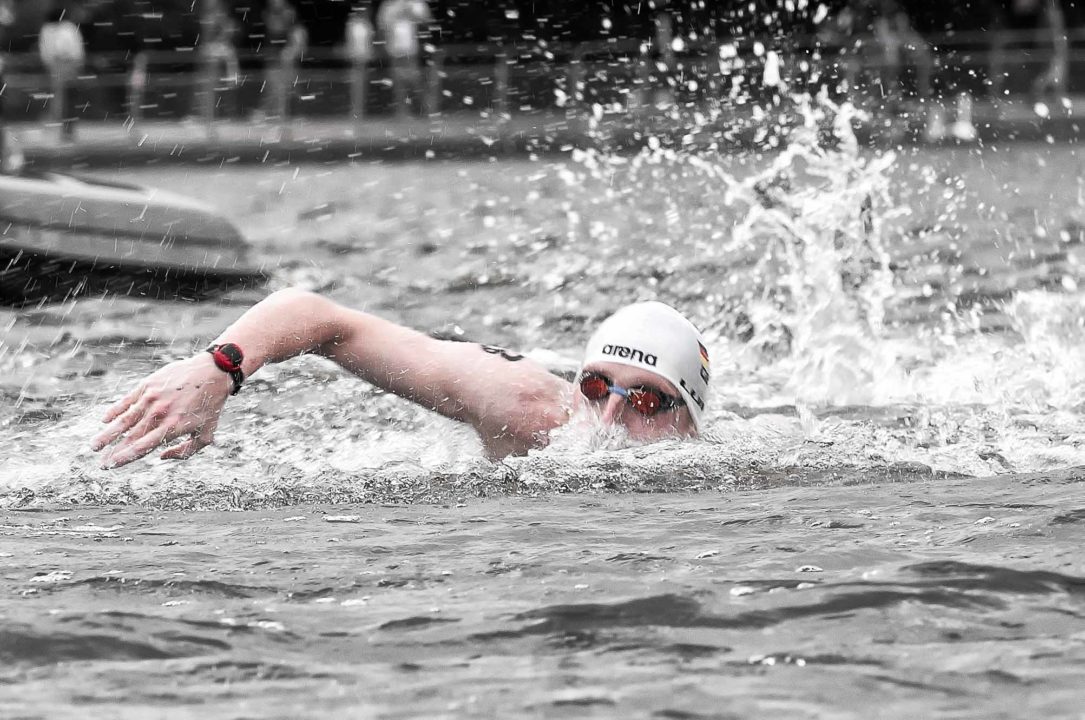After disappointingly missing the Olympic podium in the sport’s premier 10 kilometer distance in 2012, Greece’s Spyridon Gianniotis earned sweet redemption to win the men’s World Championship in a very fast 1:49:11.8: a relatively comfortable margin of victory in what has been a very competitive set of open water races so far in Barcelona.
Gianniotis bode his time in a big way; after the first lap, he sat in only 46th place: 21-seconds behind Ous Mellouli. After lap 2, he was still only in 23rd. At 3 laps, he had climbed to 5th place and was finally in the lead pack, before roaring home to the victory.
Gianniotis, you’ll recall, was the man who began the 2012 Olympic torch relay.
He was able to pick off, coming home, a pair of swimmers who medaled in the 5km race two days ago. Germany’s Thomas Lurz was 2nd in 1:49:14.5, and Tunisia’s Ous Mellouli, who led much of this race, earned bronze in 1:49:19.2.
The difference indubitably had to have been Gianniotis’ choice to not swim the shorter 5 kilometer race. Even for these impeccably-trained athletes, swimming two such grueling races in a two-day period takes a toll. The women, who swim their 10km race on Tuesday, will have an extra day of rest, and many of the contenders (including the American champion Christine Jennings) will be on their first race of the meet.
It’s no surprise that Thomas Lurz handled the double the best, winning bronze in the 5km and silver in the 10km: he’s the reigning godfather of the sport and by far the most experienced elite open water swimmer in the world.
France’s Damien Cattin-Vidal wound up 4th in a very impressive late-career swim for him. He’s 32-years old, has never competed in an Olympic open water, but in his 2nd-straight World Championship performance performed very well. His country, unlike much of southern Europe, has a very small elite open water group.
The other story is the disappointing performance of the Americans. Alex Meyer finished 42nd, after being in the hunt early on, almost two minutes behind the leaders. Meyer will swim the 25km later in the meet, and didn’t race the 5km. Sean Ryan was 50th, another 41-seconds behind Meyer. The explanation is hard to figure out, especially for Meyer who was fresh and swam much better at Nationals this year than it did last year.
Overall, there were a ton of surprisingly-low finishes in this race, thanks in part to a relatively-huge field of 65 swimmers (evidence as to why FINA keeps the Olympic field relatively small). These tactics, though, are part of what makes the sport interesting.
Two swimmers failed to finish, and China’s Lijun Zu was red-carded on the 2nd lap and disqualified after missing a turn buoy. This was not an isolated problem: Canada’s Richard Weinberger did the same, but was able to go back and re-round the buoy, but it may have cost him a medal position.
The top 10 finishers, plus other selected results:
1. Spyridon Gianniotis, Greece, 1:49:11.8
2. Thomas Lurz, Germany, 1:49:14.5
3. Ous Mellouli, Tunisia, 1:49:19.2
4. Damien Cattin-Vidal, France, 1:49:19.8
5. Richard Weinberger, Canada, 1:49:19.9
6. Ferry Weertman, Netherlands, 1:49:20.3
7. Allan do Carmo, Brazil, 1:48:25.2
8. Chad Ho, South Africa, 1:49:26.3
9. Christian Reichert, Germany, 1:49:26.8
10. Guillermo Bertola, Argentina, 1:49:28.4
12. Simon Suitenga, Australia, 1:49:29.7
13. Rhys Mainstone-Hodson, Australia, 1:49:30.4
16. Chris Bryan, Ireland, 1:49:33.4
17. Sergey Bolshakov, Russia, 1:49:34.5
20. Kane Radford, New Zealand, 1:49:43.0
23. Eric Hedlin, Canada, 1:49:54.5
34. Kirill Abrosimov, Russia, 1:50:22.5
38. Daniel Fogg, Great Britain, 1:50:29.0
42. Alex Meyer, USA, 1:51:01.8
50. Sean Ryan, USA, 1:51:43.7
51. Troy Prinsloo, South Africa, 1:51:48.0

Daniel Fogg led the race for the first stretch in a very fast pace but had already dropped back by the end of the 1st lap. To my mind, the best story of the day was that when Richard Weinberger missed a turn buoy, he lost 40 seconds and dropped to 53rd place. Over the next lap, he fought his way to 1st place. Unfortunately, he couldn’t hold that adrenalin rush and ended up just out of the medals.
Another amazing thing was the pace these guys can hold for 10 km. Spectators had to walk along the seawall at a brisk pace to keep up with the swimmers. In the US and Canada, I think open water swimming is… Read more »
Gianniotis made his move early enough. Mellouli had a good-looking stroke, to be sure, he loped heavily but kept it smooth. I expected him to respond but, to my surprise, he couldn’t. He must have been very exhausted as also Thomas Lurz managed to pull away while they were quite close to finish line already. I didn’t see the first part of the race but if Mellouli had led the group, being at the peak position, I wonder his tactic.
While looking Mellouli’s swimming I got the impression that pool swimmers, who apply the loping stroke, are able to adapt into open water more easily as the sighting of a correct direction doesn’t broke their technique so badly.
ouch for Americans!